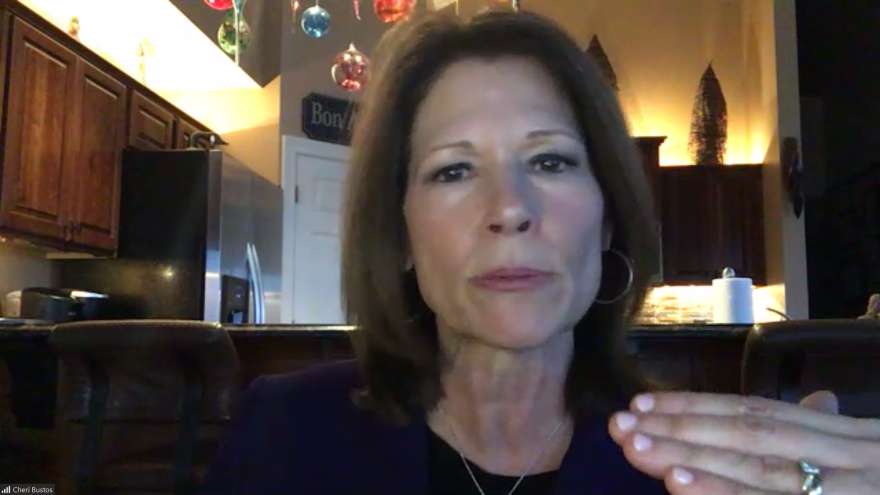Democratic lawmakers serving Peoria at both the state and federal levels are putting their support behind a variety of LGBTQ bills. Community members are sharing what those bills would mean to them.
Tuesday's virtual town hall highlighted the continuing fight for LGBTQ rights.
The town hall comes as trans people in particular find themselves under attack in states across the nation. States such as Arkansas and Tennessee are passing bills that would effectively ban gender-affirming care for trans youth and prevent them from taking part in school athletics.
But state Sen. David Koehler said he's not worried because of the Democratic supermajority in both chambers of the General Assembly. He said he doesn't see LGBTQ rights in Illinois being rolled back anytime soon.
"We don't have to worry about going backwards on this thing, as long as we continue to have people with open minds and open hearts, you know, taking office," said Koehler.
Koehler said he wants to keep Illinois a leader in expanding LGBTQ rights.
General Assembly proposals
Illinois legislators are proposing multiple bills in the General Assembly that would make a difference for the community.
One of those bills would decriminalize HIV.
Merrill Cole is a queer studies professor at Western Illinois University. He describes himself as a 32-year survivor of HIV. He said he remembers how stigmatized the virus and AIDS used to be.
“I remember vividly how people with HIV were mistreated 30 years ago, not only by general American society, but also by various government entities,” said Cole. "I felt that my existence was suspect, if not illegal."
Under current state law, it is still a felony to engage in certain behaviors without disclosing an HIV-positive status.
"It is no longer 1989," said Cole. "The science of HIV has changed dramatically."
Koehler said he remembers the height of the pandemic. He said he is surprised the state legislature hasn’t taken action sooner.
“It was still a really scary endeavor, and, you know, just the number of deaths that had occurred was astounding,” said Koehler.
Trans birth certificates
A different bill would allow trans people to change the gender on their birth certificates without needing a doctor’s letter.
Lars Avis is the secretary of Peoria Proud. The group was one of the town hall’s sponsors. Avis said official documents should reflect who trans people are.
"The gender marker on the birth certificate is the one that they assign you when you're a baby," said Avis. "You're not really consulted about what gender you identify as when you're born."
He said many trans people aren’t able to see a doctor, let alone one who’s gender-affirming.
“As a trans person, I can accurately speak to my own gender and my gender marker without having a letter from a medical professional saying that I'm allowed to change my gender marker in my documentation,” said Avis.
If passed and signed into law, the bill would mark the second major change to the birth certificate gender change process in recent years. Up until 2018, trans people in Illinois were required to undergo gender confirmation surgery in order to make that change.
The view from Washington
Meanwhile, the fight for national LGBTQ rights continues in Washington, D.C.
U.S. Rep. Cheri Bustos said she will continue to advocate for the LGBTQ community in Congress.
Bustos said nobody should be treated differently from anybody else because of who they love.
"I believe that every Illinoisan deserves fairness under the law, and is entitled to the same civil right protections, regardless of their sex, their sexual orientation, or gender identity," said Bustos.
In February, Bustos voted in favor of the Equality Act, which would fully protect the LGBTQ community under civil rights law. That would mean protections against discrimination in areas such as employment, housing, and education.
But Bustos said that’s just part of what the LGBTQ community needs.
“Our work doesn't stop with passing that one bill," said Bustos. "I know you know we've got a long road ahead of us.”
The Equality Act passed the U.S. House in February. No action has been taken on it yet in the Senate.
"It passed the House in 2019, it passed again this month, and my hope is that the Senate will take up the bill very soon," said Bustos.
Bustos said she supports eliminating the Senate filibuster to get the bill passed there. Currently, bills in the Senate require 60 members to end debate and move to a vote.
"I don't think there's any hope that 10 Republicans are going to get on board with us," said Bustos. "I just don't see that happening."
Republicans and Democrats hold 50 seats each in the Senate, with Vice President Kamala Harris holding the tie-breaking vote.
As for Koehler, he said Illinois has come a long way on LGBTQ acceptance in the last decade.
“Thank goodness we have moved light years ahead on this thing," said Koehler. "We're, you know, I don't know what took us so long but thank goodness we've at least come this far.”
He said that progress is something to be celebrated.
We’re living in unprecedented times when information changes by the minute. WCBU will continue to be here for you, keeping you up-to-date with the live, local and trusted news you need. Help ensure WCBU can continue with its in-depth and comprehensive COVID-19 coverage as the situation evolves by making a contribution.


